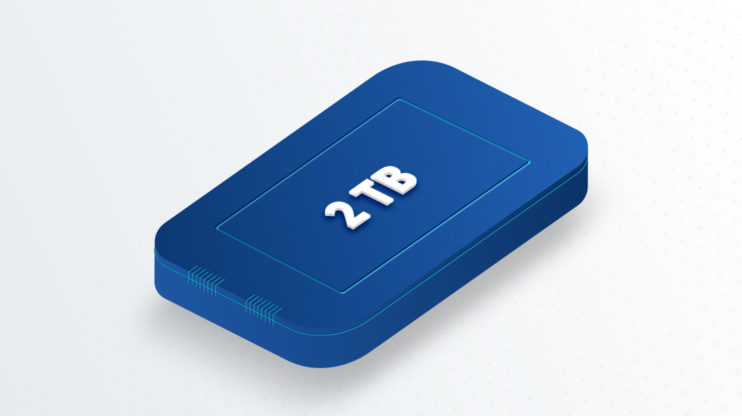What is an SSD?
Many desktop computers, laptops, and web servers use Solid State Drives (SSD) for storing and accessing data. Compared to traditional Hard Disk Drives (HDD), their improved data speeds and performance provide a faster, more stable environment for operating systems, applications, media, games, etc.
Unlike HDDs, SSDs have no moving parts, making them more durable and reliable. This lack of a spinning disk and movable read/write head allows for much faster transfer speeds and lower energy consumption. The same flash memory that powers USB drives and SD cards also gives SSDs their speed and durability.

SSDs and web hosting
SSDs are particularly suited to the demanding conditions under which web servers operate. Their small size, speed, reliability, energy efficiency, and lower running temperatures make them excellent for serving web content.
Cloud hosting providers often use a network of physical servers which run on SSDs. These types of web hosts offer better website performance and reliability, largely due to the faster access to data provided by SSDs.
Which is better for hosting, SSD or HDD?
Even though HDD set the standard for web servers in the past, many modern web hosting providers are transitioning to SSDs to provide the best server performance. Benchmarking shows that SSDs are up to 20x faster than HDDs at responding to a request and can transfer up to 95% more data when under heavy loads. In addition, the seek times for data on an SSD are drastically shorter than on an HDD. With no moving parts, SSDs access requested data almost instantly compared to an average of 10ms for an HDD.
With the importance placed on fast page loading speeds, it’s critical to host your website on a robust network utilizing SSDs. Servers running on SSDs can produce a snappy user experience that encourages visitors to stay on your website and keep coming back for more.
Agencies or businesses with a large volume of websites to host and maintain will appreciate the reliability and high performance of SSDs. Their low latency and faster data transfer speeds combined with their physical durability provide significantly better website performance and uptime.
While SSDs are a far better choice for speed, HDDs offer more stable long-term storage at a dramatically lower cost. For example, the average price for a 1 TB SSD currently sits around $150. In comparison, average prices for a 6 TB HDD are only slightly higher, at around $170.
Because SSDs are more costly in terms of storage space, HDDs still have their place in the web hosting industry. Their large capacities and superior ability to store data for long periods of time make them ideal for long-term storage and even serving large files. Many web hosts and Content Delivery Networks (CDN) leverage caching methods along with a combination of SSDs and HDDs to deliver a variety of speed-optimized web content.





